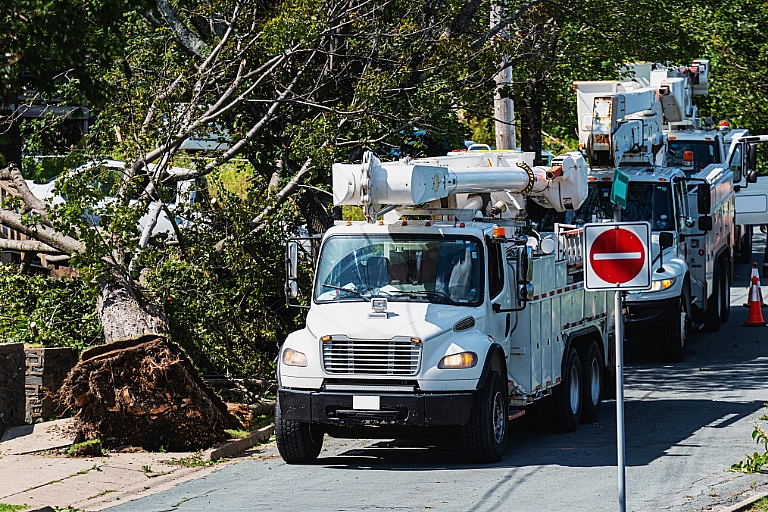What is augmented reality?
The definition of augmented reality (AR) is the enhancement of an interactive, virtual component onto a real-world environment or situation, layering tools like informational text, 3D graphics atop a user’s field of vision. The adoption of AR has seen exponential growth over the last several years, with more than a billion global users projected in 2022 alone.
AR has the potential to create more digitized, efficient and safer environments for workers. In the power and utilities industry, where working in hazardous environments is relatively common, advanced technologies like this can help team members navigate the physical conditions around them, improve service delivery and decrease the downtime of essential equipment that customers rely on.
There are numerous general benefits to the adoption of augmented reality technologies in the workplace. These include:
- The ability to perform actions on mobile devices and instantly receive relevant information with enriched, real-world objects.
- The use of devices to record real-world measurements that can be sent directly to a customer relationship management (CRM) system or case file.
- Placing digital AR tools on top of objects in the real world, helping to show service technicians how to perform tasks.
- Being guided in the field by a remote expert, even through complex repairs, with the help of on-screen annotations, in some cases enabling customer self-service.
- Enhancing hazard reporting and situational hazard management, by both improving the records a company keeps and being highly compatible with hands-free technologies like wearables.
What challenges does the power and utilities sector face?
Power and utilities is one of the most dynamic and complex sectors in the world. According to Deloitte, while the industry continues to grow, with electricity sales in the United States expanding by close to 4% between 2020 and 2021, things like unpredictable weather and the adoption of new technologies like flexible load programs are quickly transforming how providers do business, providing both opportunities and challenges.
Operational resiliency in service delivery has never been as important for providers as it is right now. The keys to thriving in this constantly shifting environment include simplifying and automating workflows, connecting disparate data points, and providing real-time views anywhere in the world.
For this article, the following definitions are used for the power and utilities sector:
- Electric utilities such as hydroelectric (water) power, fossil fuel power, and alternative energy sources like nuclear, wind, and solar.
- Gas utilities, which include natural gas distribution networks for natural gas retailing and commodity consumption.
- Water utilities that include production, transmission, and distribution of water for consumption, as well as the treatment of wastewater. Waterpower is considered separate, as mentioned above.
Even from a bird’s eye view, the challenges faced become evident.
Power and utility providers increasingly need to collect accurate data and information from equipment without on-site travel, in part because of pandemic-related restrictions, as well as the need to service geographically remote locations.
Regulation of the industry has become increasingly more stringent, with hefty fines for health and safety concerns as well as missed service level agreements (SLAs).
Even in complex situations, both residential and commercial customers are looking for better and faster resolution times.
Compounding these realities is an already shrinking workforce in utilities, with job growth currently receding by more than 7% over a 10-year period.

The benefits of augmented reality in power and utilities
In 2020, SightCall partnered with The Service Council to deliver a comprehensive report on the views and perspectives of field service technicians from a number of backgrounds.
Technicians unanimously concurred that more technical knowledge was essential to their jobs today. And while about 70% also said customer and management demands had grown more intense, compounding pre-existing stresses, another 60% of respondents agreed that IT tools help to make their daily work easier.
Incorporating an AR tool into service operations can make processes considerably more productive for both the provider and the customer. For example, technicians can use live video with AR capabilities to provide guided troubleshooting on the spot or conduct pre-visit assessments. First-time fix rates and overall resolution time can be significantly improved which have a direct result on enhanced customer satisfaction.
Adoption of AR yields a number of specific operational improvements.
Benefit #1: Create a more efficient pre-visit space.
Utility workers can diagnose the severity of issues with pre-visit assessments to ensure the right people, parts and tools are dispatched to the field. Inspection times are shortened, and parts wastage and truck rolls avoided. Inspection times, waste and truck rolls are all reduced by triaging issues remotely via AR-powered live video.
Benefit #2: Enable demos at the point of purchase.
Power companies can bolster their sales departments in front of municipalities and private consumers alike, with remote product demos using immersive visual support to establish better understanding of a product or service.
Benefit #3: Drive improvements in regulatory compliance and avoid fines.
With an AR-powered digital platform, work order data can be seamlessly documented and recorded for internal QA, auditing and hazard reporting to flag dangers. Routine service inspections can be conducted consistently through remote experts, whatever external disruptions a company faces.
Benefit #4: Transform the training experience.
Newer technicians can be guided and shown different tasks on the job, with real-time visual assistance giving them an immersive training experience for the circumstances they will encounter in the real world. Indeed, some studies suggest that extended reality-based training such as through AR tools are particularly appropriate for riskier or more dangerous work environments where traditional training is less suitable.
AR options are also highly flexible and can be accessed through real-time visual assistance or from a self-guided option, with the latter being an essential component of digital process automation.

Why choose SightCall for power and utilities?
The choice of SightCall, in particular, comes with a number of advantages and benefits. SightCall helps utility companies save on the three most expensive and indispensable assets they have: time, cost, and knowledge.
- Time: Think reduced outage times, fewer missed Service-Level Agreements (SLAs), and a decreased percentage of rework or duplicate dispatches to solve problems.
- Cost: By reducing truck rolls, avoiding regulatory fines, and experiencing less customer churn, SightCall helps drive significant cost savings for your business.
Our platform decreases the likelihood of equipment-related accidents by transforming safety procedures to interactive, auditable experiences. Additionally, its use helps to cut down on CO2 and other emission-related expenses by eliminating the time, cost, and carbon impact associated with wasted dispatches.
- Knowledge. SightCall’s visual assistance platform allows your utility organization to retain workers and preserve their knowledge for the next generation.
Our research suggests that enterprises have realized a 50% reduction in truck rolls, a 69% reduction in resolution time, an 81% increase in first-time fix rates, and a 41% reduction in training time after adopting SightCall within their remote assistance operations.
Field service workers are not the only parties to experience benefits from remote visual assistance adoption. Additional utilities services like smart devices and solar panels, as well as customer self-service on more routine matters, are particularly amenable to digital process automation, which is explained below.
AR and digital process automation
An ideal partner to augmented reality, digital process automation harnesses technology to standardize workflows, improve performance and curtail errors that traditionally hinder essential business processes. It boosts the work of technicians and connections with customers.
SightCall’s own digital process automation solution, Digital Flows, raises service experiences to the next level by digitizing manual processes to improve efficiency and reduce manual error.
Technician, agent, and customer procedures can all be delivered via a Digital Flow to guide self-service tasks in a repeatable, scalable, and auditable manner.
Standardized, step-by-step guidance, including detailed instructions and checklists, help technicians and customers navigate tasks and work orders, without ambiguity or confusion. Participants in a Digital Flow also have the option to easily and rapidly escalate their inquiry to a person-to-person video assistance call if a higher level of support is required.
Two of the use cases below explain how digital process automation can embolden power and utilities processes in the field.
Can augmented reality create greater sustainability?
As companies move toward net-zero emissions, AR and video assistance tools can help them collect data on their carbon footprint and savings.
The U.S. power sector produced close to a third of overall energy emissions in 2020, according to Energy Information Administration estimates. And while the sector is well on the road to zero emissions, process efficiencies such as a reduced need for physical travel and the ability to closely assess internal energy usage and other sustainability calculations will remain essential.
Augmented reality tools provided by the SightCall platform perform environmental footprint measurements at the end of every video call, using data points like travel distance and time saved, and average fuel consumption.
Such precise KPIs can demonstrate the return on investment of not sending experts on-site, as well as demonstrate true action around sustainability.

Examples of AR in power and utilities
Case Study 1: Better digital integrations, reduced waste for water utility
A water utility company grappled with slow response times, the increasing pressures of regulatory commitments, and hefty fines for violations discovered during audits. It sought to reduce water leaks and shorten resolution time for maintenance and repairs for its customers, with a digital solution that integrated closely with its Microsoft Dynamics 365 suite.
With AR-powered visual assistance, customer service agents can now initiate a live visual assistance call directly from Dynamics 365, proactively diagnosing the problem in advance of resources being dispatched for an in-person site visit.
The result is accelerated resolution times, improved data capture with seamless integration into the utility’s existing system, and eliminating the time, cost and carbon impact of wasted dispatches. The company also observed reduced wastewater supplies, allowing it to better comply with industry and environmental regulations, and avoid fines.
Case Study 2: Power company connects customers, technicians with rapid remote support
Inspecting and even replacing electricity meters are core components of the work of power companies, with the highest levels of accuracy essential for correct monitoring and even billing information.
This power utility faced several challenges, including technician scheduling challenges, the ability to access meters in-person because of travel restrictions during COVID-19, and requiring the latest technology for smart service of older equipment.
Under its new, digitized system, a customer completes a self-guided Digital Flow, with forms and photos of their meter submitted before a technician arrives on site. The service technician, armed with these details, can quickly access the meter as soon as they arrive.
When an issue is encountered that they are not trained for, the tech can access expert support with SightCall video assistance, completing the job in a single trip. The result is boosted customer satisfaction, as well as a reduction in additional trips to the site and other redundancies that act as a drag on enterprise productivity.
Case Study 3: For complex wind turbines, issue resolution found in single site visit
Another large power company with an extensive renewable energy branch needed a virtual assistance platform for inspecting and maintaining wind turbines that functioned despite spotty and inconsistent internet connections in some areas.
With remote locales particularly vulnerable to limited data access, the augmented reality platform deployed by the utility needed to have the capacity to operate in low-bandwidth environments, as well as to save data and information to the technician’s device for immediate upload to the file once connectivity was re-established.
The company has options for its technicians, regardless of skill level, to use either a self-service option guided by a Digital Flow, or to escalate complex situations to a video call, both of which allow wind turbine inspections to be completed in a single visit.
For self-service, online-capable workflows can retrieve error code definitions and photos to document issues for future training. Alternatively, an in-office expert can guide the technician to remedy more complex problems, with SightCall’s globally distributed platform nodes that guarantee high performance and massive scalability wherever they are in the world.
Supporting the rapid evolution of a major industry
Power and utilities are rapidly evolving. Researchers at Gartner identified greater operational resiliency as one of the leading trends of the industry, and believe the latest technology will lead the way in realizing it.
The ability to harness internal data more effectively will go a long way toward minimizing complexities, anticipating potential energy challenges and failures, and responding to the need to be more environmentally friendly. By enhancing the “eyes” a company has to view service landscapes and assess problems, augmented reality capabilities provide an essential boost to this work.
If you’re ready to learn more about how augmented reality can transform operations in your organization, contact us today to request a SightCall demo.

